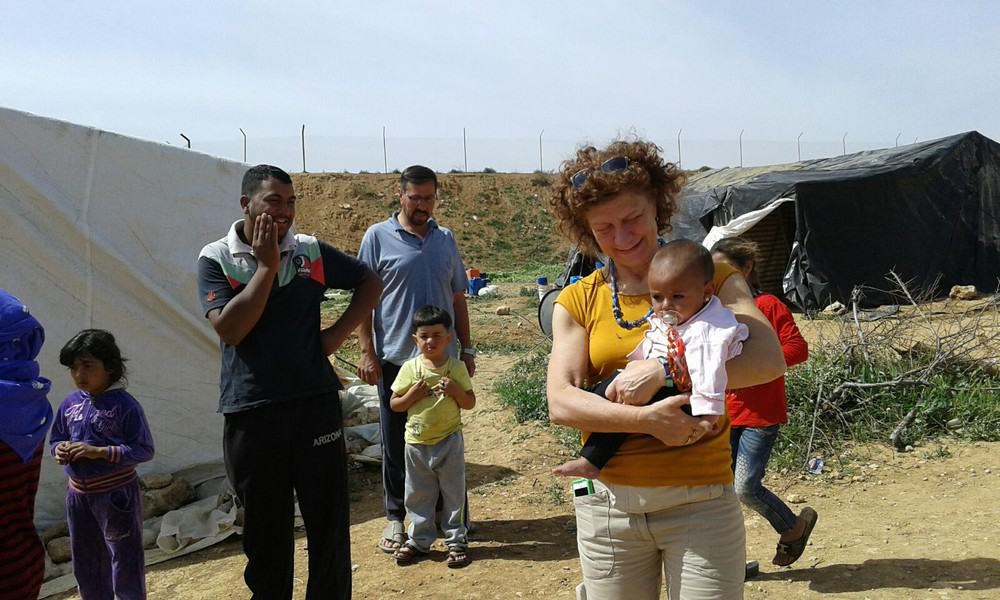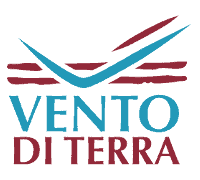
The ‘solidarity travellers’ visit Vento di Terra’s projects
It’s the end of March when Vento di Terra’s office in Amman receives the news: the Italian delegation will visit them in the first week of April! Immediately, we meet and define the itinerary for the week in all its details. Paying close attention to including everything, the activities are organised and each day of the visit takes shape.
Monday, April 2nd
Early wake at dawn, ready to leave for Mafraq. The aim for the day is to inform our partner in Mafraq (JRO) of the delegation’s visit and to organise alongside them all the activities for the week. We’re ready, with our notebooks and pens in one hand, and Google Translate in the other hand (you never know, prevention is always better than trying to solve unwanted misunderstandings)!! And so it goes, with an alternation of English and Arabic, aided by an attempt to communicate through gestures which with time begins to take shape and aids our information exchange. We then agree, with teachers and local coordinators, on the schedule of the day, which will take place in the JRO centre on April 4th. All this accompanied by a warm and delicious cup of chai tea! We dismiss ourselves and leave for the informal camp of Hawaje. This camp, alongside the other camps in the area, is geographically marginal, far from the towns and from all ‘institutional observers’. In Hawaje, a formative workshop, held by our Syrian psychologist Wafa, was planned. The idea is to involve the camp’s women and teach them how to produce natural soap. This knowledge will be spread through direct and active involvement of the women with the aim of making the whole day about them and putting them in control of the day. The workshop will be then repeated for our travellers, which will get here on April 5th. Among the women participating in the workshop, a leader for our Italian delegation’s experience. 12 women take part in the workshop, accompanied by their children and grandchildren who, attracted by the stamps and smells, decide to take part as well and actively participate in the creation of handmade natural soap.
By the end of the activity, the leader is chosen. Her name is Samah, and along with the other women of the camp, she has actively taken part in the workshop and was ready to spread the knowledge of making natural soap to our Italian delegation. We say goodbye to everyone, and they reply “InshAllah!”, “Come back soon”!
It’s almost the end of the day when we reach a supermarket in Mafraq, as we still had to define the costs of the products we needed to prepare the Makluba, a traditional dish of Middle-Eastern cuisine made with rice, chicken and vegetables and accompanied by salad and yogurt, which we would eat on the last day of our visit to the camps (and which would be traditionally prepared by a woman from one of the camps). And, of course, we couldn’t avoid another sweet cup of chai: you might as well refuse it, but it will still be served to you!!
At this point, the day is over and we return to our base.
Wednesday, April 4th
We meet at 7:45, the delegation is ready to visit the JRO centre in Mafraq and the Zaatari informal camp.
When we reach the JRO centre, the classes have already begun; the children, most of which come from the informal camps, are seated and are attentively listening to the lessons. There’s an English class, a maths class and a grammar class. The support the centre delivers is vital for them, especially for those that haven’t been in the school system for years. Most teachers are Syrian, representing an added value both to the centre and, especially, to the kids that attend it. Many of these teachers once taught in Syria, and having the possibility to maintain their teaching position also in Jordan is important and encouraging for them. All of them are very enthusiastic for their job in this centre, as shown by the fact they are currently working for free, while the awaiting for new funds continues.
The welcoming feeling of the centre is immediately perceivable. As soon as we arrive, we are offered something to drink, a choice between qahwa (coffee) and chai. It looks as though chai has conquered the hearts of (almost) all the delegation. Some, though, opt for coffee: probably the early wake has left them quite tired!! As we taste these traditional drinks, a symbol of hospitality, Sara Cimatti (Project Manager) and Maria Chiara Dellora (Head of the Country’s branch), give us a broad description of the various projects and activities Vento di Terra is carrying out in Jordan, giving an explanation of the context in which such projects are implemented, the critical conditions in which they take place and the good practices that have developed over years of experience.
In the meantime, the children grow louder and louder, mainly because of their impatience to meet us and show us their classrooms. They wait for us in the classes, and as soon as the door opens we are greeted with “marhaba, ahlan wa sahlan”, “Hi! Welcome”!! The delegation is invited to take a seat and observe the lessons taking place and the method of teaching in the classrooms of the centre. They also take some time to talk with the students and teachers, creating a moment of personal exchange.
Once we leave the centre, we head towards Zaatari. Here, we planned a moment of assembly with the inhabitants of the camp during which there is a continuous exchange of looks, handshakes, gestures and games, making this a pleasant moment a pleasant meeting between the delegation and the people living in the camp. We’re welcomed by a family in their tent, we’re invited to sit and, of course, to drink a cup of… chai!! We talk about dreams and hopes, both for the present and the future. We exchange ideas, thoughts and stories about two nations: Syria and Jordan.
Thursday, April 5th
Today’s schedule plans our trip to three camps: Jaber, Hawaje 1 and Hawaje 2.
The Jaber camp is the furthest from the centre of Mafraq. The wall that separates it from the Syrian border is only 4 km away. The only people living in the camp are female widows and their children. The head of the camp is Umkhaled, a woman with Bedouin traits, with a strong and determined personality, always very careful to ensure that everything in the camp is working perfectly. The women work in the nearby fields, owned by Jordanians, and cultivate peaches, tomatoes and vegetables, depending on the season. They also proudly manage a henhouse, donated by the previous delegation which has visited Mafraq last December.
After visiting Jaber, the delegation left for the Hawaje 1 camp, where they were greeted by a group of women, ready to deliver their workshop on manufacturing natural soap. It’s interesting to see how roles can invert very easily with just a bit of motivation, determination and practicality. Now these women are the key of this morning’s events, as they will be teaching the art of making soap!! We are the students and they are the teachers, and to be honest, incredibly good teachers!! The room where the workshop takes place is ready, furnished with carpets and cushions so to make the room look more welcoming and comfortable. And so the workshop begins, inevitably once again accompanied by the warm and sweet drink: the chai.
Samah attentively follows each step, paying close attention not to skip any procedure, making it seem as though she’s been making soap for her whole life. She’s involving the whole group and invites us to actively participate. The soap was almost ready for practical use!! In the meantime, in the neighbouring camp (Hawaje 2), the Makluba is being prepared. This dish, even though it might appear very simple, needs a very long preparation, especially if the aim is to involve all the people in the camp, meaning preparing food for around 75 people.
Once the morning comes to an end, along with the workshop, our delegation leaves the camp to reach Hawaje 2, where they would taste the dish which had been accurately prepared by the “mums” of the camp and would share their meal with them. At the entrance of the camp, they see kids impatiently waiting to play with them and meet them. After a brief moment of games, we sit all together in the lunch room that the women, with our help, have prepared. “Sahten”, enjoy your meal!! In no time at all, we eat everything we are offered, proving the deliciousness of the food! We ate everything, to the last grain of rice, and started talking with the people. We thank them infinitely for cooking the Makluba for us. They shake our hands and thank us for our visit and for sharing our day with them. “Shukran”, come back soon, they say.
It’s time to head back to Amman. Two very intense days, full of stories, people, experiences. The days end with a mixture of emotions and with a lot of learning from the experiences the delegation went through. However, the people’s eyes reflect the truth of a different reality to ours in those places, and of many difficulties, which are apparently unsolvable, that highlight the importance of the presence of humanitarian organisations such as Vento di Terra.
Bay, ma’issalame
Goodbye







































